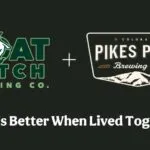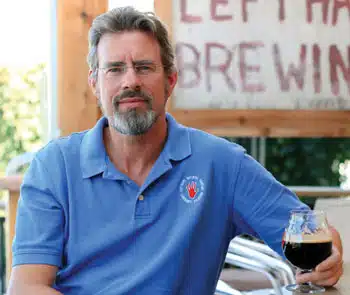‘An irritating trickle of stuff’
Brewers still face echoes of COVID

BROOMFIELD — They’ve fought to survive the COVID-19 pandemic and the addition of beer and wine to grocery shelves. Now, brewing industry executives agree, they’re dealing with a more existential issue.
As Turn It Up Media founder Chad Melis, who had been marketing director at Lyons-based Oskar Blues Brewery, put it on Tuesday at a BizWest CEO Roundtable, the new challenge is “how to get the consumer to care.”
Or as Jeffrey Green, owner of Very Nice Brewing Co. in Nederland, put it, “How to get people to come out again.”
SPONSORED CONTENT
The problems, as described by Davin Helden, owner of Liquid Mechanics Brewing Co. in Lafayette, are “an irritating trickle of stuff.”
The brewing executives noted that the COVID-19 pandemic created a keg full of changed behaviors that have continued since the coronavirus restrictions were lifted.
“Our society has changed,” noted John Tayer, president and CEO of the Boulder Chamber. “COVID has changed in terms of the ways people interact. There’s also more of a social bias against alcohol in general, sort of a health trend that continues in that direction.”
Convenience also is an issue, Tayer said. “There’s such a lack of interest in social contact outside the home because everything can be delivered to you,” he said. “That’s just not as prevalent now. Unfortunately, it’s taking time to come back.”
“It’s not gone, it’s just maybe not as prevalent as it once was,” noted Sean Nohavec, business-development manager at management consulting company Plante Moran, which hosted the CEO Roundtable in its Broomfield office. “Introverts have definitely found their comfort zone at home.”
Helden recalled that, “when I grew up, there were no (cell) phones. So for fun, it would be finding other humans. It also involved beer. Kids nowadays have instant access to whatever they want at any time, so they don’t necessarily have to find other humans to find that human connection. People like craft beer because of the social aspect of being around other humans.”
When that social aspect was restricted, interest in craft beer declined as well, he said, citing declining attendance at Denver’s annual Great American Beer Festival.
Green agreed. “People stopped going to GABF because they didn’t go during COVID and they’re like, ‘Wow, we just saved a ton of money by not going to GABF,’” he said.
COVID-19 restrictions also forced people to work from home, and many decided they liked it and still do it. What that meant, however, Helden said, was that “people working remotely are not going out after work to have a beer.”
“It’s not COVID as in people are afraid they’re going to catch COVID anymore,” Green said. “It’s more that people are realizing how much money they’ve saved by not going out.
“That has affected hospitality in general,” he said. “A lot of going out has been too expensive for people. They’re going to stay home, they’re going to watch Netflix, they’re going to make their own sourdough, they’re going to buy their own beer from a liquor store. That’s hurt all of us, and I’m not just talking about drinks. I’m talking about just going out in general.”
Eric Wallace, CEO of Left Hand Brewing Co. in Longmont, recalled that, “as a young male, I was going out to bars and clubs to meet women and talk to them. Now that all happens online. You don’t have to go to a physical location to meet somebody.”
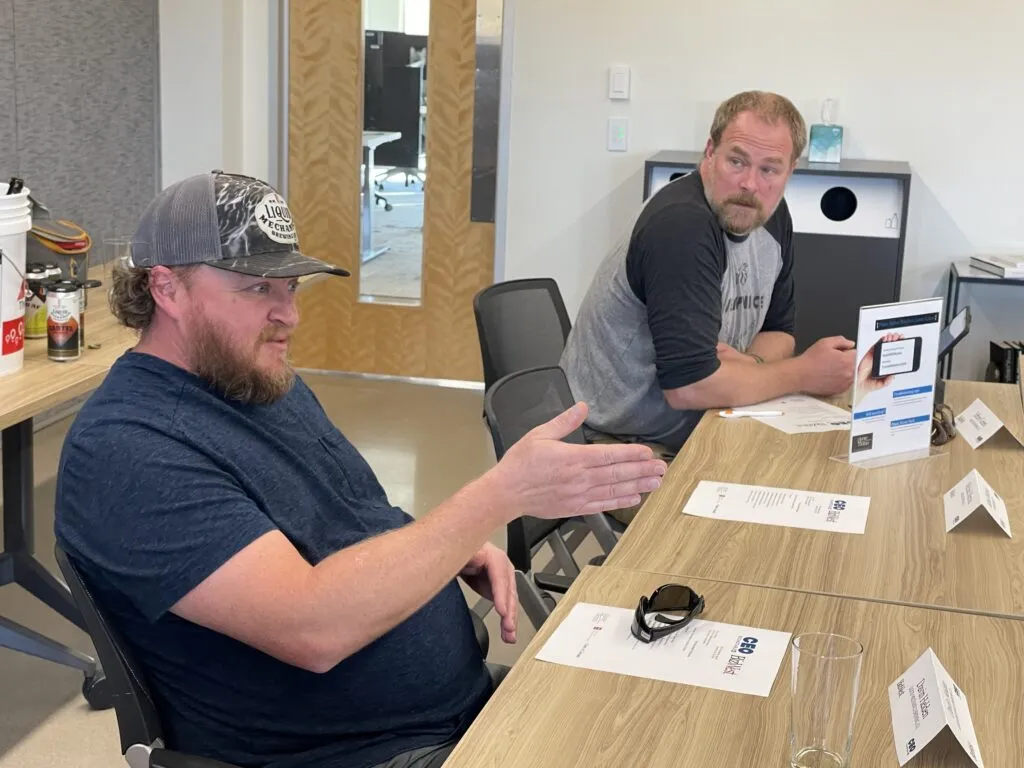
Wallace cited multiple issues that contribute to declining alcohol sales in general — not only the societal changes during the pandemic that turned into habits but the emergence of easy and legalized online sports betting.
“Kids are socializing from home. We trained them to do that during COVID,” he said. “So they’ve got their headphones on, they’re killing demons, they’re watching games, they’re talking to their friends. They’re doing all this stuff at the same time. You’re watching four games, you’ve got parlays going, you’ve got fantasy football going, and it never really struck me: There are billions and billions of discretionary dollars being sucked out of the economy – out of real goods like we do – and spent on gambling.
“Discretionary spending is under attack,” Wallace said. “What’s eating up people’s discretionary spending is legalized gambling. It is ubiquitous. All my people in the ‘30s, ‘40s, they gamble on everything. Even if you only burn $20, $50, $100 a week, how many pints of undrunken beer is that? How many pints if you’re paying $100 or $200 for cable service so you can see all the games so that you can gamble on them?
“Wealthier demographics can afford to lose $20 or $50 a week on legalized gambling,” he said. “It’s the people on the margins where we start to lose them.
“I spent my last year of high school in Las Vegas in the ‘70s, and gambling was tightly regulated,” he said. “Now it’s on everybody’s phone.”
Legal marijuana also drains some of that discretionary income, Wallace said, and discussions about its health impacts rival those about alcohol.
“I think we are seeing the opening salvos in a war between alcohol interests, cannabis interests, psychologists and emergency-room people that are starting to deal with this huge tsunami of health impacts of cannabis,” Wallace said. “It’s completely unstudied, understudied, and we’re going to see a lot of this. It’s starting to pop up in the trade press, and the incidence of psychosis among young drinking-age people who aren’t drinking is really scary. It’s going to be years of discussion going on. As the alcohol-vs.-no alcohol battle is waged, you’re going to see a foray into cannabis attacks as well.
“There’s no one answer to this,” he said. “It’s a whole accumulation of completely new stuff that’s going around the pike, and birth rates are falling as well.”
Tayer cited the “market change for Colorado because of shelf space. Liquor stores having to compete with grocery stores, that’s been a crusher.”
“It’s not an on-off switch. It’s a 1%, 2%, 3% annual drip,” Wallace said. “And then you add in all of these other factors, like shelf space, Now we’ve invited it into Colorado after stopping it for decades. The wine getting unleashed is really punishing liquor stores,” he said, not as much as through sales as through foot traffic into supermarkets instead of liquor stores.
Wallace said Left Hand’s beers are big sellers at supermarkets, but Helden said Liquid Mechanics doesn’t distribute to grocers “because they have poor storage.”
Besides, he said, “I didn’t want to go into grocery stores because we hated that they’re taking business away from small liquor stores. Poor business choice? Probably, but I think you have to decide who you are.”
Part of the reason for rising prices is increases in the minimum wage, Wallace said.
“Minimum wage is just another wall in the trash compactor, coming in on hospitality businesses,” he said. “Trying to keep anybody working in the kitchen these days is really challenging.”
Tayer said part of that problem is that government officials “just didn’t hear the voice of businesses saying, ‘This is going to break our back,’” but Wallace responded that “that’s because the owners are behind the bar or in the kitchen washing dishes because they can’t afford to keep all the help. Who’s got time to sit around a four-hour city council meeting? Most of us don’t.”
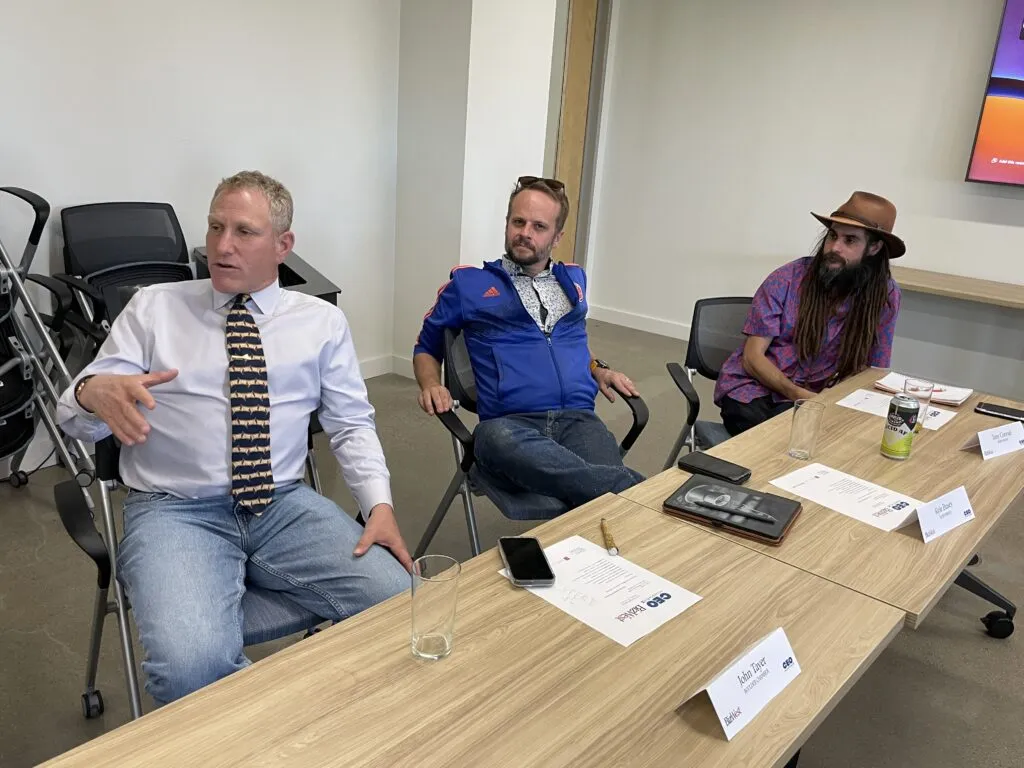
Helden added that “some owners are just waiting for their leases to come up. I feel like there’s going to be a lot more closings real quick.”
Green, however, noted that “we could charge $2 a beer and people would still complain. We’ve got to do more than make it affordable. You have to make it desirable.”
“How do you survive? We’re going to have to bring some breweries together,” Wallace said. “We’re going to have to get together and cooperatively survive, because it’s a siege right now, and who outlasts the other are the ones that are going to be successful.”
At Left Hand, he said, “we’re in a different band than the rest of you guys in that we’re in wide distribution. We’re set up to do volume, we’re set up to do high-speed packaging. Everybody in distribution on any kind of wider basis is, what’s the vernacular? F—-d is the word I think I’m looking for, because it’s an inexorable squeeze. It’s really getting harder and harder and harder to get through the chain process and get on shelves in multiple states. We’re actually boosting up our sales and marketing team a little bit to try to address that, and we’re in talks with a few different companies – not only breweries: ‘Hey, let’s get together here.’
“Breweries way bigger than us are done,” Wallace said. “I know that for a fact; it’s just not public yet.”
Marketer Melis wasn’t nearly as gloomy.
“I think it’s a lot easier than the conversation you guys are having,” he said. “With breweries, just getting organized and understanding who you are and what message you’re putting out there, just getting consistent with it, is all very easy to say but it’s hard to do.
“During COVID, communication with the consumer became obvious. Nobody knew what was going on. They didn’t know whether you were closed or open or any of those things.
“The way that you engage with the consumer and the way you make them feel, what resonates with them, is a big part of whether they’re going to decide to spend their discretionary spending,” Melis acknowledged that spending on marketing isn’t an easy choice in tough times. “It’s really hard to be consistent and authentic with your brand voice when you’re trying to fight an uphill battle,” he said. “You guys are talking about real problems. The marketing thing is a bit nice to have. When you can’t afford to do all the things you need to do, marketing takes a back seat.”
Still, he said, “we have to make them feel like they’re getting something, somehow. It’s not money, necessarily. It’s value. It’s personal validation that they’re supporting a good local business. We have to create some authentic feeling of value for them. Because, like you all said, there are a lot of other things they could be doing, and it could be just staying home.”
Craft breweries, Melis said, “have historically been the social fabric of communities. And it’s not just getting people together to drink. There has been financial support, making your space available, giving water to the community. The value that we all bring has been part of that fabric.
“Yeah, maybe people aren’t as social, there’s a lot of headwinds. But I’m talking about how to create messaging that makes people care. You’ve contributed to those towns in a lot of ways.
“Maybe you’re not discounting the beer. Maybe you’re giving 20% to a charity. Whatever is relevant to your people,” Melis said. “I think we have to find a way to create value as a craft brewery. The role we played in the community was the most satisfying thing, something like a true north.”
Wallace agreed.
“We’re aligned on that, and that’s why I didn’t sell,” he said. “I think it’s important for businesses to be connected locally, and for us, we want to have an impact.”
However, he added, the plight of a brewery-rich North Carolina city that is trying to pick up the pieces after Hurricane Helene devastated it caused a shift in Left Hand’s priorities.
“Our foundation is usually locally focused, but Asheville? We’re going to end up sending them some money from our foundation because they got flooded and we know what it feels like,” Wallace said. “We didn’t get flooded as bad as a lot of those businesses” after the September 2013 flood and deluge crippled the Northern Front Range, “but we lived in mud for months on end. The bridge next to the brewery is going to open on Thursday, so we still live flood every single day from 2013.”
But can local brewers’ good deeds keep coming if their product isn’t selling? Wallace said he’s frustrated that mass-market brewers are making a comeback, noting that light beers are the biggest sellers in states such as Ohio.
“We’re posing a basic question to society: Does it even matter any more? Or are we all just going to let the big brands come swooping back in?
“Excuse me, but 31 years ago, our whole mission was to give people choices that weren’t that,” Wallace said. “And now, we are down to providing that, which I fear and believe is a result of us trying to be everything to everybody and putting every frickin’ ingredient in the universe into beer so that it doesn’t taste like beer.
“We’ve completely wrecked an entire generational cohort coming through as to what they should expect beer to taste like, and there’s going to be a lot of retraining as new legal-drinking-age kids come into the market. Like, ‘Here, this is what used to be considered a grown-up beer. We’re going to have to train you to like it again. It doesn’t taste like a chocolate cupcake.”
At Busey Brews in Nederland, head brewer Tony Conrad had an answer for that.
“I take very seriously that beer should taste like beer,” Conrad said. “Where do you draw that line? You have to bring people in. I like to stick with pretty traditional types of beer. I’ll do subtle stuff, like peach cream ale from Palisade peaches. You can barely taste the peach, but it says ‘peach’ on the menu. It’s subtle but it still tastes like beer.”
His formula is “using these ingredients and getting people on board with subtlety. Perception is a big deal. We make the menu read what the people want to see, but slide in actual beer and usually they like it.”
Conrad’s boss, owner Kyle Busey, noted that, “especially in the summertime, all the big Harley groups come up to Nederland and stop, and surprisingly enough, we brewed peaches and cream ale for them and they liked it.”
“Thousand-year-old styles might wane for awhile,” Green said, “but those are the ones that are going to survive.”
The Roundtable was co-sponsored by Boulder-based law firm Berg Hill Greenleaf Ruscitti LLP, Bank of Colorado and Plante Moran, which hosted the event at its Broomfield office. Market president Aaron Spear represented Bank of Colorado, and business-development officer Sean Nohavec represented Plante Moran.
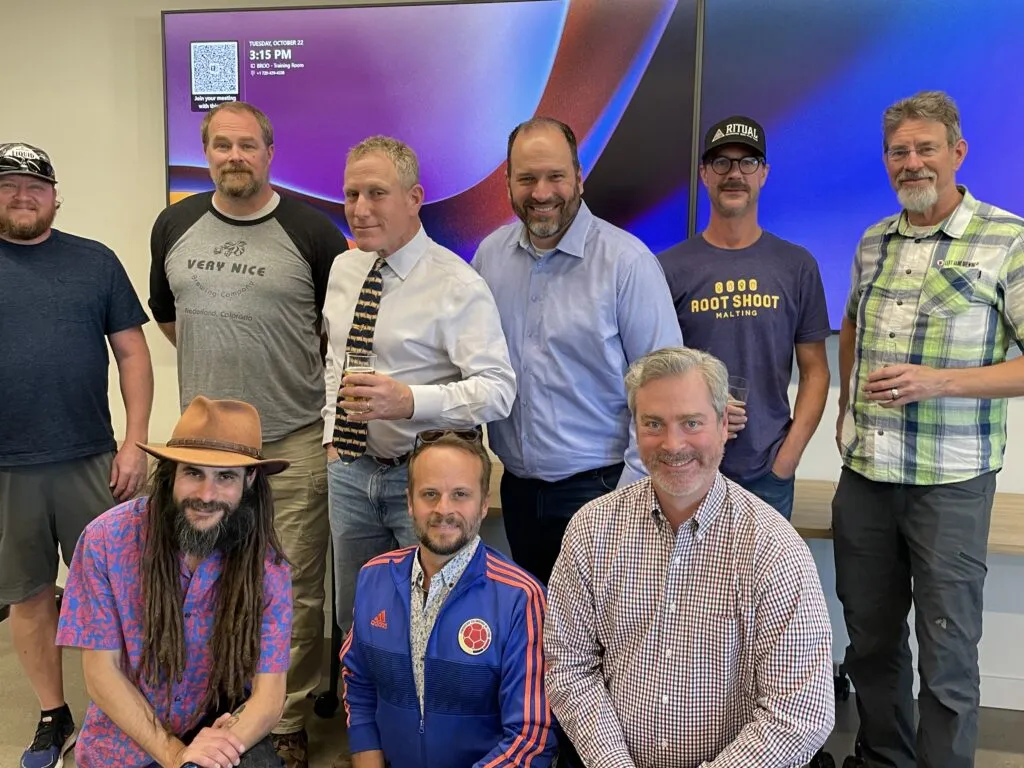
They’ve fought to survive the COVID-19 pandemic and the addition of beer and wine to grocery shelves. Now, brewing industry executives agree, they’re dealing with a more existential issue.

